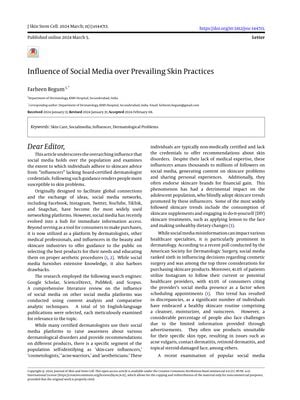TLDR Social media often spreads unreliable skincare advice, leading to potential skin problems, especially in teens.
The article highlights the significant influence of social media on skincare practices, emphasizing that many individuals follow advice from non-certified "influencers," leading to potential skin problems. A comprehensive review of 50 publications revealed that while some dermatologists use social media to provide reliable information, a large portion of skincare content is generated by non-experts, often promoting products for financial gain. This trend particularly affects adolescents, who adopt potentially harmful skincare routines. The study underscores the need for dermatologists to actively counteract misinformation and promote evidence-based skincare advice.
 26 citations
,
October 2021 in “Current Dermatology Reports”
26 citations
,
October 2021 in “Current Dermatology Reports” Social media is increasingly used in dermatology for education and networking but has risks like misinformation and privacy issues.
 4 citations
,
November 2020 in “Journal of Cosmetic Dermatology”
4 citations
,
November 2020 in “Journal of Cosmetic Dermatology” Most Facebook posts about hair loss treatments are promotional and not medically supported, with better quality information found on YouTube.
 September 2025 in “Cosmoderma”
September 2025 in “Cosmoderma” Pandemic stress worsens hair loss and skin issues, suggesting combined mental and skin care treatments.
3 citations
,
October 2023 in “Cosmetics” Healthy lifestyle changes can significantly improve skin health as you age.
 January 2025 in “RSC Pharmaceutics”
January 2025 in “RSC Pharmaceutics” Smart microneedles using advanced tech could improve psoriasis treatment.
3 citations
,
February 2024 in “Patient Preference and Adherence” Isotretinoin treatment in Palestine shows poor adherence to guidelines, with common side effects and a need for better prescribing practices and patient education.
 April 2024 in “International journal of women's health”
April 2024 in “International journal of women's health” Adult female acne is a complex condition that can worsen with menopause, requiring holistic treatment and tailored skincare at different life stages.





